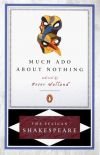
This joyous play, the last comedy of Shakespeare's career, sums up his stagecraft with a display of seemingly effortless skill. Prospero, exiled Duke of Milan, living on an enchanted island, has the opportunity to punish and forgive his enemies when he raises a tempest that drives them ashore--as well as to forestall …

A king foolishly divides his kingdom between his scheming two oldest daughters and estranges himself from the daughter who loves him. So begins this profoundly moving and disturbing tragedy that, perhaps more than any other work in literature, challenges the notion of a coherent and just universe. The king and others …

Titus Andronicus is a tragedy by William Shakespeare, believed to have been written between 1588 and 1593, probably in collaboration with George Peele. It is thought to be Shakespeare's first tragedy, and is often seen as his attempt to emulate the violent and bloody revenge plays of his contemporaries, which were …

The Merry Wives of Windsor is a comedy by William Shakespeare, first published in 1602, though believed to have been written prior to 1597. The Windsor of the play's title is a reference to Windsor Castle in Berkshire, England, and though nominally set in the reign of Henry IV, the play makes no pretence to exist …

Much Ado About Nothing is a comedic play by William Shakespeare thought to have been written in 1598 and 1599, as Shakespeare was approaching the middle of his career. The play was included in the First Folio, published in 1623. Much Ado About Nothing is generally considered one of Shakespeare's best comedies, because …

Troilus and Cressida is a tragedy by William Shakespeare, believed to have been written in 1602. It was described by Frederick S. Boas as one of Shakespeare's problem plays. The play ends on a very bleak note with the death of the noble Trojan Hector and destruction of the love between Troilus and Cressida. Throughout …

The final play in Shakespeare's masterly dramatization of the strife between the Houses of York and Lancaster, Richard III offers a stunning portrait of an archvillain — a man of cunning and ruthless ambition who seduces, betrays and murders his way to the throne. In the process, Richard delivers great speeches and …

 English
English Español
Español Deutsch
Deutsch

